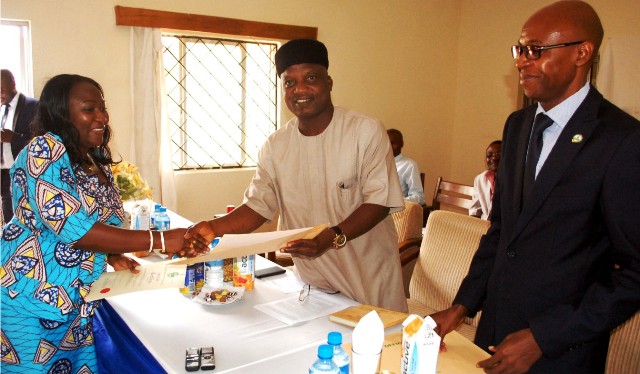Business
World Food Day: RSG Unveils Plan To Grow Rice

The Rivers State Government says, plans are in top gear to grow rice in the state in order to make the commodity available for citizens of the State.
Making the disclosure in a press conference to mark this year’s World Food Day in her office in Port Harcourt, yesterday, the State Commissioner for Agriculture, Barr. Onimim Jack said already two areas have been identified for growing rice in large quantity.
According to her, the two include Odual and Rumuewo in the Abua/Odual local government and Emohua respectively.
She explained that “we are almost at the point of signing Memorandum of Understanding”, (MoU) with the two communities.
The agric commission revealed that the project of Rumuewo was an abandoned one and the government was back on ground with negotiations with the community.
She added that the community is giving out 20,000 hectares even as she said a large farm was being expected.
For Odual, jack said the farm was not expected to be big as the Community has offered only 500 hectares.
She explained that the cost at Odual is a primary forest which is capital intensive to prepare.
“We are starting with clearing 100 hectares with help from the federal government”, she said.
Answering a question on the diversification of agriculture as a means of curbing recession in the country, she explained that agriculture should not be seen as an alternative to oil.
“I have never seen agric as alternative to way farmers, I see it as what it is, agriculture”, she said.
She explained that agriculture should have not been relegated to the background in the first place.
“We should have had agric all along not because oil is no longer feasible that we are talking about agriculture”, she said.
On the need for large scale agriculture in the state, she said though a welcome development, those holding economic and making it profit orientated the world over are the small and medium scale farmers, adding that the impossibility of having large expanse of land for agricultural purposes should not be ruled out.
On the practice were participants display products that they did not actually produce during the world food day celebrations, the State Commissioner while acknowledging the possibility said the state would allocate stands to all the 23 LGAs.
The other stands, according to her include investors, agribusiness people and people who may wish to advertise fertilizer amongst others.
“It is not business as usual as the development will be checked by the various Divisional Agric officers (DAOs) across the LGAs.
This years’ event falls on Sunday, the 16th of October, 2016 and will be celebrated on Monday, October 17, 2016.
The theme of the 2016 invent is: “Food and Agriculture must change too”.
Business
Nigeria’s ETF correction deepens as STANBICETF30, VETGRIF30 see 50% decline in a week

Business
BOI Introduces Business Clinic

Business
Dangote signs $400 mln equipment deal with China’s XCMG to speed up refinery expansion

-
Maritime1 day ago
Customs Declares War Against Narcotics Baron At Idiroko Border
-
Maritime1 day ago
Nigeria To Pilot Regional Fishing Vessels Register In Gulf Of Guinea —Oyetola
-

 Sports1 day ago
Sports1 day agoGombe-Gara Rejects Chelle $130,000 monthly salary
-
Maritime1 day ago
NIMASA,NAF Boost Unmanned Aerial Surveillance For Maritime Security
-
Maritime1 day ago
NIWA Collaborates ICPC TO Strengthen Integrity, Revenue
-

 Sports1 day ago
Sports1 day agoTEAM RIVERS SET TO WIN 4×400 ” MORROW” …Wins Triple jump Silver
-

 Sports1 day ago
Sports1 day agoNSC eyes international hosting rights
-

 Sports1 day ago
Sports1 day agoNPFL Drops To 91st In Global League Rankings

